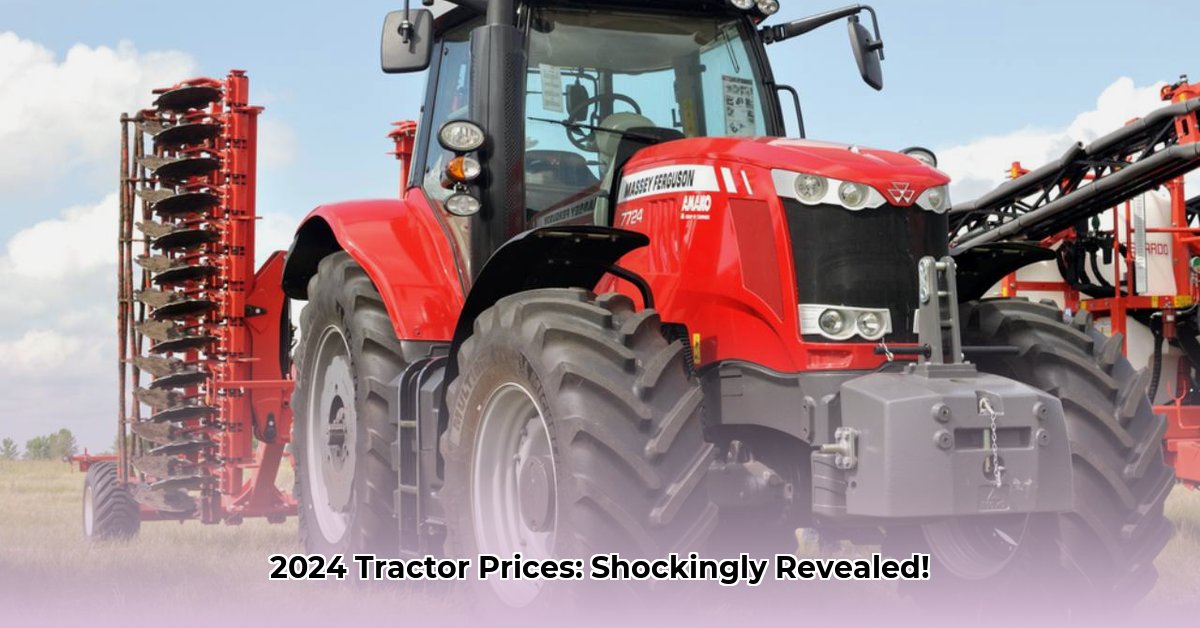
Average Cost of a Tractor: A Comprehensive Guide
Buying a tractor is a significant investment for any individual or business. This guide provides a clear understanding of the factors influencing tractor costs, helping you make an informed decision. The price of a tractor depends on several key variables, and understanding these is vital before making a purchase. Let's delve into the specifics to determine how much you should budget. For short-term needs, consider the cost-effectiveness of renting; check out tractor rental costs for more information.
Decoding Tractor Prices: Key Factors
The price range for tractors is vast, from a few thousand dollars for a used, smaller model to well over half a million for a brand-new, high-horsepower machine. Several key factors significantly influence the final cost:
Horsepower (HP): This represents the tractor's engine power. Higher horsepower generally means increased capabilities and a higher purchase price. A small tractor suitable for light yard work will cost significantly less than a large tractor designed for commercial farming.
Age: Tractors, like cars, depreciate over time. A new tractor commands a substantially higher price than a used one; however, consider the potential for higher repair costs associated with an older machine.
Brand: Established brands often command premium prices due to their reputation for reliability and quality. However, lesser-known brands can offer competitive value, requiring thorough research.
Features and Attachments: Additional features like air conditioning, front-end loaders, or GPS guidance systems add considerably to the overall cost. Carefully consider which features are essential for your needs.
Do you need a high-powered tractor for heavy farm work, or will a smaller model suffice for occasional yard maintenance? This fundamental question influences the cost dramatically.
New, Used, or Rent: Choosing the Right Option
Selecting between purchasing a new tractor, a used tractor, or renting one is a critical initial step. Each option presents unique advantages and drawbacks:
1. Buying a New Tractor:
- Pros: Warranty protection, latest technology, higher reliability, and lower initial maintenance costs.
- Cons: Substantially higher upfront investment and rapid depreciation.
2. Buying a Used Tractor:
- Pros: Lower initial cost, potential for significant savings.
- Cons: Increased risk of repairs, limited or no warranty, requiring a thorough pre-purchase inspection (mechanical and possibly even a background check on its history).
3. Renting a Tractor:
- Pros: Cost-effective for short-term projects, eliminating maintenance and storage concerns.
- Cons: Can be more expensive for frequent use, limited availability and usage restrictions outlined in the rental agreement.
Estimating Your Tractor's Cost: Price Ranges
The table below offers a general estimated price range. Actual prices vary significantly based on factors already discussed. Use these as a starting point for more detailed research:
| Tractor Category | Estimated Price Range (USD) | Considerations |
|---|---|---|
| New Small (< 50 HP) | $3,000 - $50,000 | Small properties, hobby farms, light tasks. |
| New Medium (50-100 HP) | $50,000 - $150,000 | Medium-sized farms, commercial applications. |
| New Large (> 100 HP) | $150,000 - $600,000+ | Large-scale farming, demanding operations. |
| Used Small (< 50 HP) | $1,000 - $20,000 | Budget-friendly, but thorough inspection is paramount. |
| Used Medium (50-100 HP) | $20,000 - $100,000 | Balance of cost and capability; careful inspection is crucial. |
| Used Large (> 100 HP) | $100,000 - $350,000+ | Significant savings; higher risk of repairs and maintenance. |
| Rental (per day/hour) | Varies greatly by location | Obtain quotes from local equipment rental companies for accurate pricing. |
Beyond the Purchase Price: Total Cost of Ownership
Consider ongoing expenses:
- Maintenance: Regular servicing is vital for longevity.
- Fuel: Fuel costs depend on usage and efficiency.
- Repairs: Budget for potential breakdowns, especially with used tractors.
- Insurance: Protecting your investment is crucial.
These factors significantly impact the overall cost of ownership, potentially making a cheaper initial purchase price less favorable in the long run.
Making Your Decision: A Step-by-Step Approach
- Define Your Needs: What tasks will the tractor perform? How frequently will you need it?
- Set a Budget: Consider all costs, including purchase price, maintenance, fuel, and repairs.
- Research Models: Compare new and used tractors from different brands.
- Get Quotes: Obtain prices from multiple dealers or rental companies.
- Inspect Carefully: Thoroughly inspect any used tractor before purchasing.
- Secure Financing: If needed, explore financing options and compare interest rates.
- Consult Experts: Consider talking to experienced farmers or agricultural professionals for advice.
Remember, choosing the right tractor involves a careful assessment of your needs, budget, and long-term goals. Don't rush the process! A well-informed decision will ensure your investment serves you effectively for years to come.